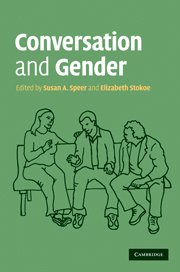Book contents
- Frontmatter
- Contents
- Contributors
- Data and transcription
- 1 An introduction to conversation and gender
- Part I Gender, person reference and self-categorization
- Part II Gender, repair and recipient design
- Part III Gender and action formation
- Part IV Gender identities and membership categorization practices
- 11 Accomplishing a cross-gender identity: A case of passing in children's talk-in-interaction
- 12 Engendering children's play: Person reference in children's conflictual interaction
- 13 Being there for the children: The collaborative construction of gender inequality in divorce mediation
- 14 Gender as a practical concern in children'smanagement of play participation
- References
- Author index
- Subject index
11 - Accomplishing a cross-gender identity: A case of passing in children's talk-in-interaction
Published online by Cambridge University Press: 05 June 2012
- Frontmatter
- Contents
- Contributors
- Data and transcription
- 1 An introduction to conversation and gender
- Part I Gender, person reference and self-categorization
- Part II Gender, repair and recipient design
- Part III Gender and action formation
- Part IV Gender identities and membership categorization practices
- 11 Accomplishing a cross-gender identity: A case of passing in children's talk-in-interaction
- 12 Engendering children's play: Person reference in children's conflictual interaction
- 13 Being there for the children: The collaborative construction of gender inequality in divorce mediation
- 14 Gender as a practical concern in children'smanagement of play participation
- References
- Author index
- Subject index
Summary
Introduction
Garfinkel's (1967) account of the methods used by a transsexual to pass as a woman, Agnes, was groundbreaking with respect to the then existing social theories of gender. Through analysis of the practices Agnes reported using to accomplish membership as a woman, Garfinkel proposed that gender was a joint social achievement routinely produced in the course of everyday interactions. Motivated by ideas of gender as a situational accomplishment (see also Kessler & McKenna, 1978; Speer, 2005a; Speer & Green, 2007; Weatherall, 2002a; West & Zimmerman, 1987), in this chapter we present a case study of a 6-year-old boy, William, who, for a brief time at least, assumes an identity as a girl called Charlotte. Our aim is to illuminate some of the interactional practices used by William and his classmates to support and challenge William's identity as Charlotte.
The data were drawn from a larger corpus of audio-recordings of 6- to 8-year-old children at a New Zealand school (see C. W. Butler, 2008; C. W. Butler & Weatherall, 2006). Most of the recordings in this corpus are of conversations between children outside of their interactions with adults. Written consent for participation was received from the children's parents, and children received an information sheet and were asked for verbal consent prior to wearing the mini-disc recorder.
- Type
- Chapter
- Information
- Conversation and Gender , pp. 231 - 249Publisher: Cambridge University PressPrint publication year: 2011
- 4
- Cited by



